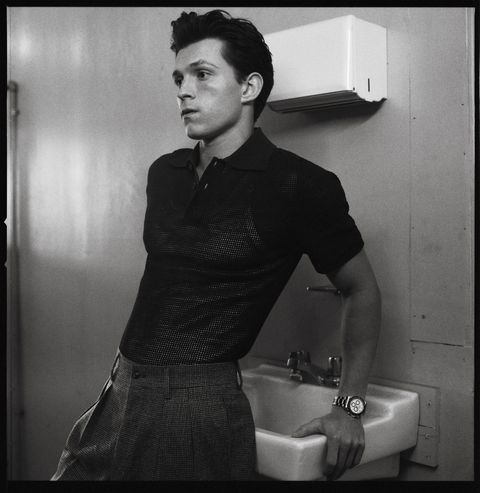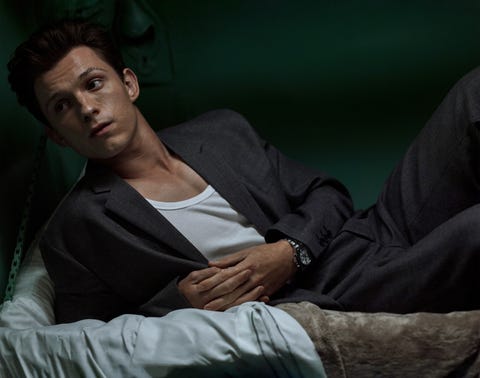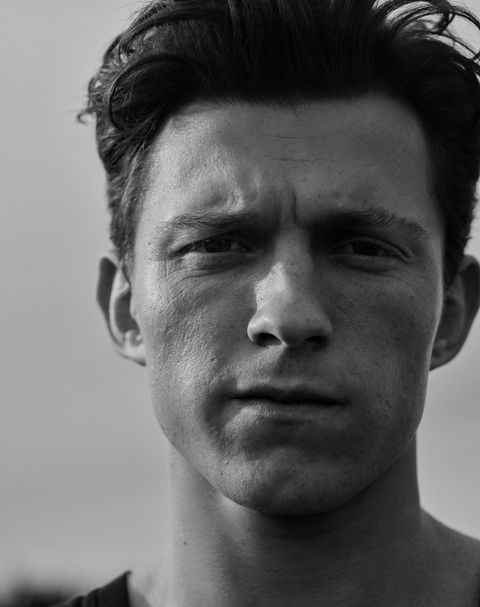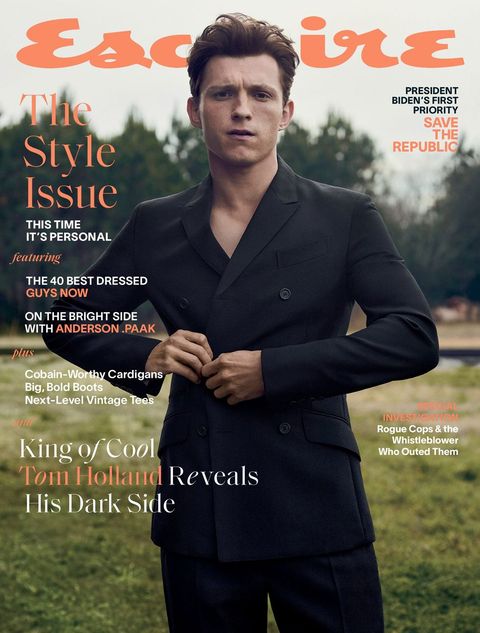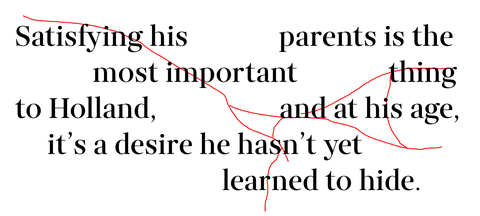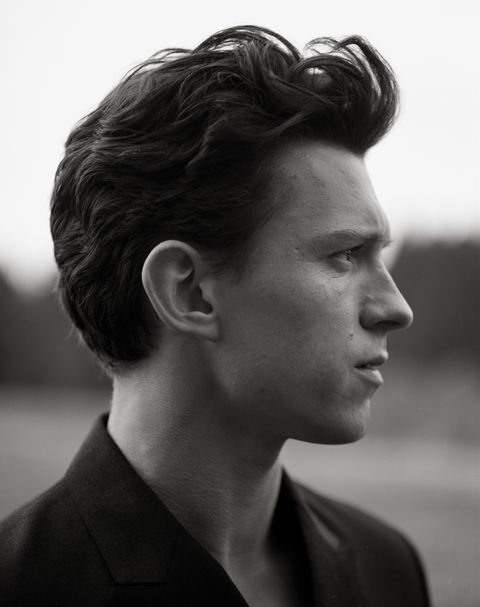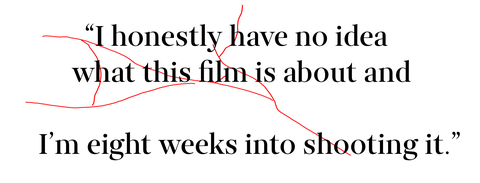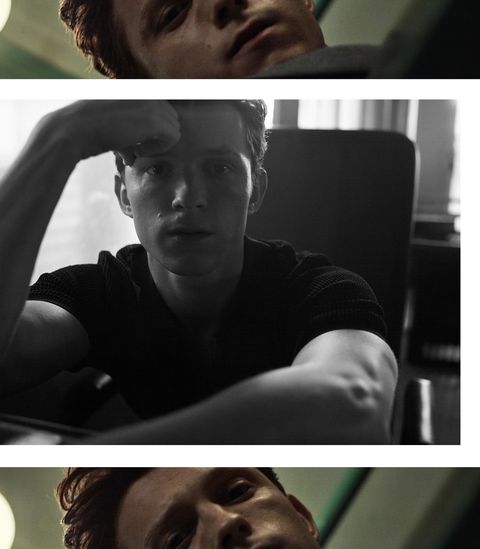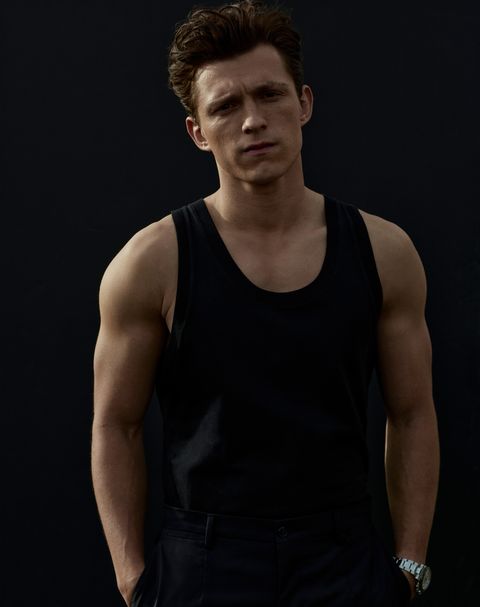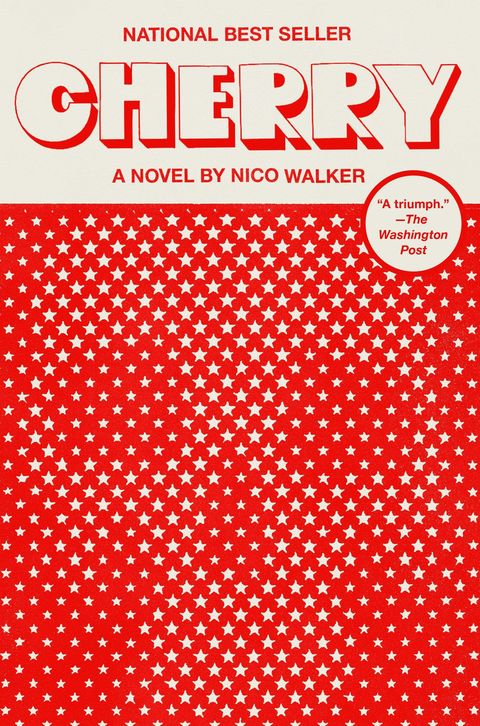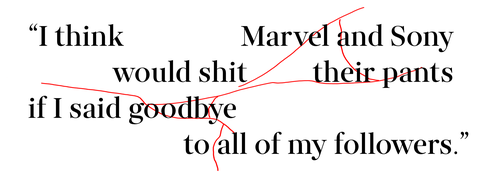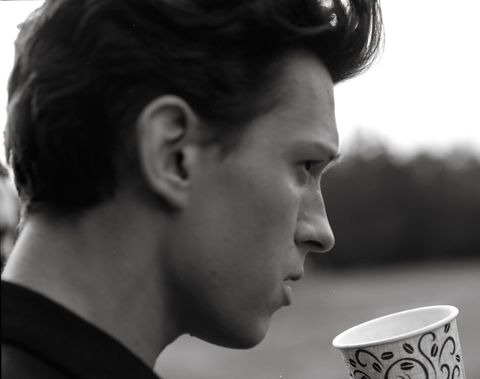Esquire
The Charm (and Grit) of Tom Holland
Can your friendly neighborhood Spider-Man convince movie audiences he’s a heroin-addicted bank robber? To his mum’s horror, the answer is yes.
Allie Jones | February 9, 2021
In the late fall of 2019, Tom Holland was lying sideways on the floor of a jail cell, sweating, convulsing, throwing up blood. His rusty brown hair had been shaved off; his typically smiling eyes were sunken. Wearing a khaki prison uniform that hung loosely on his frame, he rocked back and forth on the floor, smacking his head against the cement a few times in the process. Then the directors called, “Cut!”
Holland, the twenty-four-year-old British actor best known as Marvel’s friendly neighborhood Spider-Man, the sweet-faced hero of the ever-expanding cinematic universe, was in character for Cherry, a forthcoming film in which he plays an Army medic who returns home from the Iraq war with undiagnosed PTSD, develops a heroin addiction, and starts robbing banks. After filming the scene that takes place in the jail, Holland was a little woozy but still pleased with his performance, so he did what any young person might in a moment of pride: He sent the footage of himself writhing around in the cell to his mother. “Biggest mistake ever,” he says now, grinning. “I was like, ‘This is how my day’s going,’ and she was furious with me.
“I guess I wasn’t thinking right, and I was like, ‘Do you know who would really like to see this? My mum.’ In hindsight, it was a really stupid thing to have done.” He continues: “I think when my mum goes to see my films in particular, the things she likes the most are the moments she goes, ‘Oh, that’s my little boy.’ But in this film there’s nothing like that.”
It’s been more than a year since Cherry wrapped, and now that the color has returned to his cheeks, his mum’s forgiven him. But it took some time for his friends and family to get used to the idea of him headlining this kind of film, which is based on the novel of the same name by Nico Walker, a real-life bank robber–turned–literary darling.
Holland’s parents—Mum is Nicola Frost, a photographer, and Dad is Dominic Holland, a writer and comedian—came around after watching a full cut of the film for a second time. “They were able to enjoy it as a movie and not a biopic of their son doing heroin,” he says. “They are really proud, and they really liked it.”
Satisfying his parents is the most important thing to Holland, and at his age, it’s a desire he hasn’t yet learned to hide. “If I seek anyone’s approval, it would be my parents’,” he says. “That would be the highest level of achievement.” So by this crucial measure, Holland has already succeeded. Now he just has to figure out how to talk about the film with the rest of the world, all while fulfilling his ongoing obligations to Sony and Marvel as the youngest Spider-Man in the history of the role. It’ll be no small feat: His next release takes on the horrors of the opioid crisis, but he’ll have to remain the superhero next door. He wants to please his family, his bosses, and his fans while facing perhaps the biggest challenge of all in the process: being pleased with himself.
If by some chance you've avoided the box office for the past five years, let me be the first to tell you that Holland has dominated it, starring in two stand-alone Spider-Man films and making scene-stealing appearances in Captain America: Civil War, Avengers: Infinity War, and Avengers: Endgame (also about a war). He beat out more than a thousand competitors (including Timothée Chalamet, who has since become a good friend) for the role when he was just nineteen. Though Holland has been working in the UK since he was a child—a trained dancer, he starred in Billy Elliot in the West End at twelve—most audiences know him primarily as the very American Peter Parker. (Some may remember him as the older son in 2012’s The Impossible; Holland says he actually learned how to convulse on command, as in Cherry’s jail scene, from watching “the lovely Naomi Watts” on the set of that film.)
This article appears in the March 2021 issue of Esquire.
SUBSCRIBE
Cherry, which is set to be released in theaters on February 26 (and on Apple TV+ on March 12), just before the deadline for Oscar consideration, is Holland’s chance to reintroduce himself to audiences and his peers as a different kind of classically American character: one who bears the cost of war and slides into an addiction that takes over his life. While the subject matter is unlike anything Holland has tackled before, the production was not completely alien to him: For one thing, it was directed by Joe and Anthony Russo, who guided Holland through all those Avengers films. But it is a first step into a new and uncertain period in his career, and he’s not quite sure what that period will look like yet. Everyone around him—his collaborators, his famous mentors, and his contemporaries—says he’s ready to move outside the Marvel boundary and have his grown-up moment.
“We would do every movie for the rest of our lives with Tom Holland,” says Joe Russo, the slightly younger brother of Anthony. “He’s the hardest- working actor we’d been around. He’s so naturally talented. The charisma factor is so high that he’s an incredible conduit for any story that you want to tell. He just has it all.”
Robert Downey Jr., who has acted as Holland’s mentor onscreen and IRL, and who knows something about what it takes to reintroduce yourself to the public, says he hasn’t even seen Cherry yet, but he’s confident it will be a turning point for his protégé. “It will be that missing moment where you’ve been around the great performances, you’ve delivered the great performances within the context of being in a genre franchise, and now you have your moment to show that you can compete among the best of them in the realm of drama,” he says.
Zendaya, the MJ to Holland’s Spider-Man, watched a screener on set with him and was “super impressed,” she says. “It’s very hard to watch, because you’re like, ‘Dang, that’s my friend and I’m seeing him every day as Peter Parker.’ It’s brutal. But he took on the challenge beautifully.
“Once people get to see this version of Tom Holland, what’s next?” she asks. “Sky’s the limit.”
As Holland attempts to break out of the figurative Marvel bubble, he is working inside the literal one, filming his as-yet-untitled third Spider-Man film on a highly secure, COVID-protected soundstage in Atlanta. This is where I reach him, by Zoom, in mid-December. He’s decorated his trailer college-dorm-room style, and for the season: lots of multicolored tinsel and twinkling lights tacked up haphazardly. His entourage—which is exactly what he would not call it—is hanging around, including his hair-and-makeup artist, his dialect coach, his costumer, and one of his brothers, Harry, twenty-two. “He is my assistant, I guess, but really, he’s my brother, and he’s here as a companion, and he helps me prep everything I’ve got going on,” Holland says. (He has two more younger brothers back in London: Harry’s twin, Sam, a chef, and Paddy, who’s sixteen.)
The gang has been playing Christmas music to keep spirits up, and Holland reveals that his favorite song in the genre is “Mistletoe,” by Justin Bieber. “When I was a kid, I thought that was a banger,” he says, causing me to briefly short-circuit as I attempt to process the fact that to our still very young star, a 2011 Bieber release counts as an oldie. Holland speaks in a lilting London accent that he can easily drop for an extraordinarily convincing American dialect. Occasionally in conversation, he’ll put on his Peter Parker voice to make a point or explain something about the character. (“We’re all so used to it now, I just forget that he’s even doing it,” says Zendaya.) In answering questions, he is exceedingly deferential and careful not to offend, but he is not self-conscious or particularly guarded, either. During our second chat, he freely admits that he’s a little hungover after a celebratory dinner the night before with friends in his bubble on set. “The wine was flowing,” he says.
Holland probably deserves a few hours off, as he has worked more than just about any other actor this past year. While many of his rich and famous peers have been happy to spend the pandemic curled up in their homes, annoying people on Instagram Live, Holland has been active for months now, returning to set as soon as Sony deemed it safe—and financially necessary—to do so. When the pandemic started, he locked down in his house in London with Harry and a couple friends. (“It was carnage,” he says of the beer-soaked weeks spent with nothing to do.) But by June, he was off to Berlin to finish shooting Uncharted, an adaptation of the popular video-game franchise costarring Mark Wahlberg.
“I was getting so beat,” he says of performing a myriad of stunts on set. “I was battered and bruised, and I had tendinitis in my hamstring. I will never do a sword-fight scene ever again.”
Despite this ordeal, he took only a three-day break after the shoot wrapped before flying to Atlanta to work on Spider-Man, which has presented its own set of challenges. “This entire week of shooting, I haven’t done a single shot right way up,” he says, absentmindedly biting his cuticles, which he does every so often. “I’ve been upside down all week.”
The quick, physically grueling transition from video-game character to superhero prompted the modest, get-along Brit to do something he ordinarily wouldn’t do: assert his star power.
The problem, he says, was a wig the costume department wanted him to wear. “My hair in Uncharted is much cooler,” he explains. “I have cool shaved sides and it’s slick at the back, and that’s not very Peter Parker. He’s a bit of a loser. So they put this wig on me that was just around the sides.”
While Holland is okay looking like a bit of a loser for the sake of the character, this sides-only situation made him look like a lot of a loser. “For the first time in my life, I put my foot down as the leading actor and was like, ‘I’m not fucking wearing that wig. You can just . . . I’m going to have shorter hair and you’re going to have to deal with it.’ ”
So fans, there’s your spoiler (don’t tell anyone): In a few scenes in the next Spider-Man installment, Holland may have mysteriously shorter hair. This is just about the only detail he can reveal regarding the highly anticipated sequel, because he’s not supposed to talk about it, and also because he’s not confident he knows what happens in it.
“I honestly have no idea what this film is about and I’m eight weeks into shooting it,” he says, only slightly kidding.
This is a problem he’s created for himself. Holland has a reputation in the Marvel universe for divulging certain details about forthcoming films at inopportune moments. (In his defense, Mark Ruffalo is widely considered to be worse.) “I will always argue that I didn’t” spoil anything, he says, “and Marvel and Sony will always argue that I did.” Among his alleged transgressions: In 2018, he reportedly gave away the ending to Avengers: Infinity War to an L. A. theater full of fans about to watch it. More (somewhat inconclusive) evidence can be found in the YouTube video “tom holland spoiling stuff for 4 minutes straight,” which currently has more than twenty-four million views.
Given this at least partly earned reputation, the powers that be have limited the amount of information Holland receives about his story lines while he’s filming them. When he arrived on set in Atlanta, he got the first seventy pages of the script and a short outline for the conclusion of the film. But he’s working on a theory that the packet had some omissions, or perhaps even decoy information.
“They do it all the time,” he says. “In [Endgame], Robert Downey Jr.’s funeral scene, for the longest time I was under the impression that it was a wedding. I’m 100 percent sure that they’re still tricking me.”
This particular Spider-Man installment has been subject to a host of rumors about casting decisions. When we talk in December, several outlets are reporting that Holland’s forebears, Tobey Maguire and Andrew Garfield, will appear alongside him in some kind of ultimate Spider-verse moment. When I ask Holland about this possibility, he is suddenly positive he knows what he’s talking about.
“No, no, they will not be appearing in this film,” he says firmly. “Unless they have hidden the most massive piece of information from me, which I think is too big of a secret for them to keep from me. But as of yet, no. It’ll be a continuation of the Spider-Man movies that we’ve been making.”
You can almost hear a twinge of disappointment in his voice—there’s no telling how long his Marvel reign will go on, and it’s clear he’s eager to try his hand at projects that are not a continuation of a (very successful) franchise. It’s a watershed moment for Holland that’s both uncomfortable and appealingly universal: when you realize your first job isn’t your only job.
Holland first learned about Cherry in an ADR session (where actors rerecord dialogue in the studio) with the Russo brothers for Avengers: Endgame. At that point, the directors had won the film rights to Walker’s novel and were looking for their star. (The process of landing the rights was unusual, even by Hollywood standards: The directors negotiated with Walker over the phone while he was still incarcerated and could only talk for three minutes at a time. “The thing that made the Russos stand out from everybody else was how committed they were to actually making the film,” says Walker, who was released from prison at the end of 2019 and had little to do with the production. “They were saying, ‘We’re going to make this. This will be the next big thing we do.’ ”)
During the session in an L. A. studio, Joe Russo pulled Holland aside and told him about the opportunity. As the director explained the contours of the plot—Iraq, opioid addiction, robbing banks—“I was like, ‘Where do I sign? I will do this. I’ll do it for free,’ ” says Holland. “I didn’t do it for free, but yeah.” After signing on to the film, he spent weeks preparing physically and mentally to inhabit the world of Cherry. Inspired by his Spider-Man: Far from Home costar and personal idol Jake Gyllenhaal, who has forced his body to change, sometimes significantly, from role to role, Holland cut twenty-eight pounds from his already-not-very-big five-eight frame to look as strung out as possible. (He accomplished this by sticking to a keto diet and running every day, but “then it kind of got to a point where I was feeling so weak that I couldn’t really run,” he says. “It was so bad.”) And as he worked on losing weight, he spent a few weeks with veterans at an addiction-treatment center near the Cleveland set, listening to their stories and learning more about the opioid crisis that has decimated communities across the country.
Walker, who was not previously familiar with Holland, appreciated this effort: “What can you really say when somebody puts that much of themselves into a project that came out of your novel? I mean, you have to feel grateful for that.”
For Holland, visiting with the vets “really saddened me to a point where it made me a little depressed, and it just gave me this sense of purpose,” he says.
He is still figuring out how to talk about everything he learned. He knows that the film is a career risk, and as the family-friendly face of Marvel, he hedges a little, envisioning his fans. “I think you could probably gauge by my public persona and the way I hold myself in the public eye that I try to uphold this mentality of being a role model to young kids,” he says.
When Holland decided to join the project, the Russos assured him that the film would not glamorize drug use and that it would hopefully raise awareness about the ongoing crisis. “So for me, I saw it as an opportunity to take being a role model to a new level,” he says, “and show young kids that this is going on, and this is a problem that is on our doorstep and something that can happen to anyone at any given moment from one bad decision.
“So I hope that people will see this film and go, ‘Do you know what? I’m not going to do drugs.’ ”
It’s hard to argue with the sentiment, but I’m not sure it’s exactly what the Russos hope to get across in their work. That Holland feels the need to say to his young audience, explicitly, “Don’t do drugs” illustrates his unique bind: He’s a talented, mature actor who wants to be taken seriously by his peers, but he is also responsible for propping up a billion-dollar franchise that relies on kids wanting to be him (and their parents feeling okay about that).
I press him somewhat on his actual takeaways from his experience researching the role and working on the film. What should the U. S. and the UK be doing to combat the opioid crisis?
“I think the first hurdle would be to stop treating addicts like criminals,” he says. “People can be addicted to substances for various reasons, and it’s a tragic thing when it happens. And yes, that person has made a mistake by taking heroin. But lots of the time, especially here in America, someone will go to a doctor—and a doctor is supposed to be the person who makes you safe and makes you healthy—and say, ‘I’m really struggling from PTSD’ or ‘I'm really struggling from pain in my back’ or ‘I'm really struggling; I can’t sleep at night.’ And he prescribes you OxyContin. And OxyContin is basically just heroin in a pill.”
(This exact interaction occurs in a pivotal scene in Cherry, when Holland’s character, newly home from Iraq, is suffering from PTSD and starts taking Oxy he got from a friend. When he promises his wife, played by the luminous Ciara Bravo, that he will get real help, he goes, sweaty and near tears, to a doctor who turns around and prescribes him the very thing he knows he shouldn’t be taking.)
People with substance-use disorder should be “treated and helped,” as they were at the center he visited, Holland says. “And I think the companies who are selling drugs to people who are suffering should be held accountable for their actions.”
In the Marvel universe, which encompasses most of today’s highest-paid and best-known actors, there are two schools of thought for dealing with politics: On the one hand, you have Chris Evans (Captain America), who has become so outspoken about political issues that he helped start a website dedicated to discussing and debating them, and on the other, you have Chris Pratt (Star-Lord), who keeps his (rumored to be conservative) political beliefs hidden. (This stance caused consternation during election season; Pratt was named the “Worst Hollywood Chris” in a Twitter poll, prompting a few of his colleagues, like Downey, the Russos, and Zoe Saldana, to stick up for him.)
When I ask Holland which path he sees himself taking—Evans’s or Pratt’s—he does not directly comment on either actor but offers this: “I think I can do so much good in the world by talking about things that I understand and that I know. And I’m not going to pretend like I’m a politician. I sometimes think that a twenty-four-year-old kid shouldn’t be telling people how to live their lives or how to be politically if they don’t themselves understand massively what is going on in the world.” (This is the easiest thing for Holland to say now—I’m a kid! I don’t know anything!—but his actions so far indicate that he may end up somewhere in the middle. This past summer, for example, he shared support for the Black Lives Matter movement on Instagram, but he did not weigh in on the U. S. presidential election.)
Holland is similarly circumspect when it comes to his personal life. He’s never discussed a romantic partner in an interview before or brought someone as a date on the red carpet. But over the summer, when he was shooting in Berlin, he did share a couple photos of the British actress Nadia Parkes on Instagram. Immediately, the tabloids identified her as his girlfriend, and Holland admits now that he knew this would happen. He doesn’t quite confirm that, yes, she is his special someone, but he doesn’t deny it, either.
“I spoke to her about it, and that was something that she felt comfortable with me posting,” he says, blushing almost imperceptibly. “But I am very, very selective with what I post.”
He’s at an age now when he’s likely to have more serious relationships, and he’s not quite sure how to go about sharing them with the 39 million people who follow him on Instagram. He’s worried that his army of followers could turn against someone he cares about. “If you were to break up with that person, people will have their own opinions as to why you broke up or whose fault it was. And me being a famous person and having people that love me around the world, if I were to break up with a poor girl, they might think it was her fault. And I wouldn’t want that pressure to be on someone because of me.”
If he could quit Instagram and keep everything private, he would. “But I think Marvel and Sony would shit their pants if I said goodbye to all of my followers,” he says with another grin.
On the weekend we talk, Holland participates in a charity golf tournament in Atlanta. Golf is just about his only hobby (when I ask him what else he likes to do in his spare time, he comes up with “working out” and “preparing for jobs”). This particular course holds special significance for him, as it is located directly across from the hotel where he stayed when he was first auditioning for Spider-Man: Homecoming.
The night before his audition, he walked up and down one of the fairways, learning his lines. “And today I was playing that same golf hole with my brother, making the third film. It was a really, really strange moment,” he says. About six months after that audition, he learned he got the part. And by 2017, he was preparing for the release of Homecoming, his first stand-alone film. As part of the promotional circuit, Holland and Zendaya signed up to appear on Lip Sync Battle, the LL Cool J–hosted show featuring celebrities performing choreographed dances in a friendly-competition format. Holland, who had never headlined a movie before and was relatively unknown to American audiences, shocked everyone with his frighteningly good version of Rihanna’s “Umbrella” in drag.
He made the decision to take this kind of risk based on his own sharp understanding of his station in Hollywood at the time.
“I just knew that at that point in my life, no one really knew who I was,” he says matter-of-factly. “And I was doing this show with Zendaya, who is obviously incredibly famous, and I was really nervous about being this random guy who everyone was like, ‘Who is this person? Why are you on the stage?’ So I just thought to myself like, I’m going to have to just do something incredibly bold, and if they watch it and don’t know who I am, they’ll still be entertained by it.
“So naturally,” he concludes, “I decided to dance in the rain in fishnet tights.”
Holland’s risk assessment was accurate; his performance came out on top, and it has now been viewed more than sixty-eight million times on YouTube. “He obviously killed it,” says Zendaya. At that moment, not unlike the one he’s experiencing now, Holland made a calculation that it was time to try something different, and through some combination of personal courage, inherent charm, and childhood musical-theater training, he succeeded.
Most important, his mum was proud.


